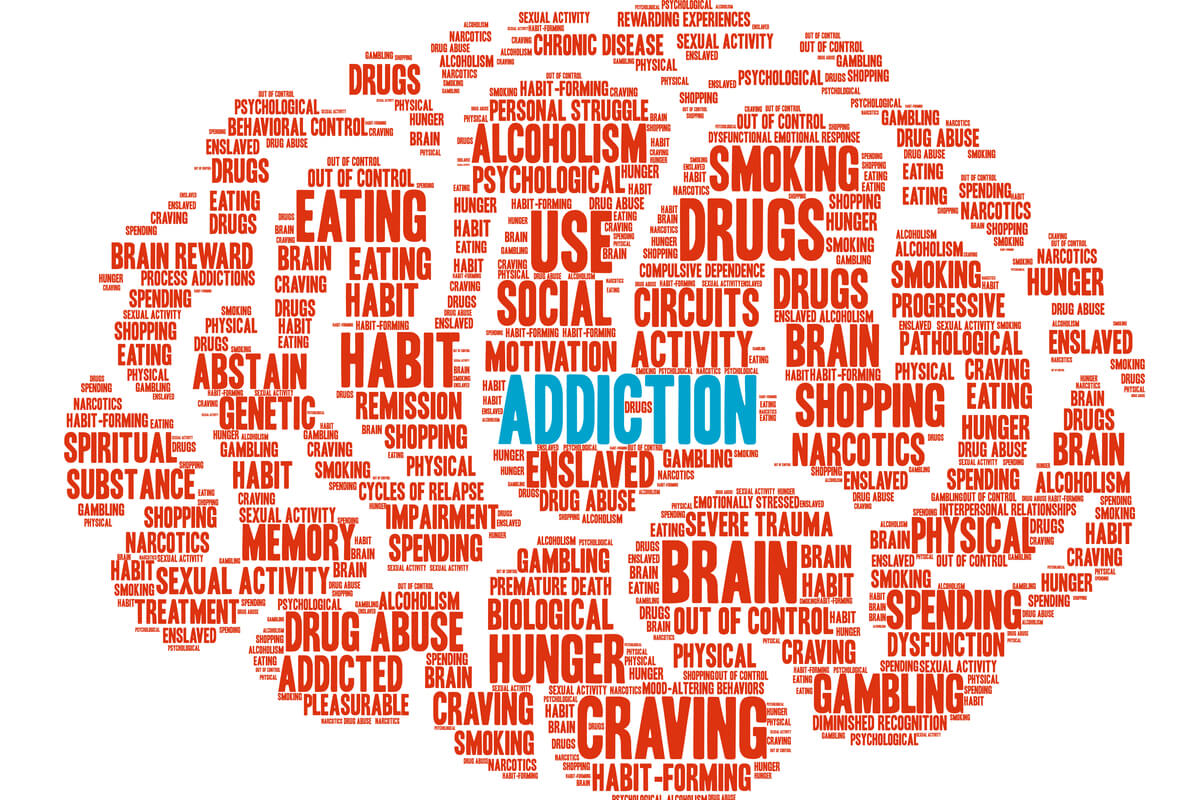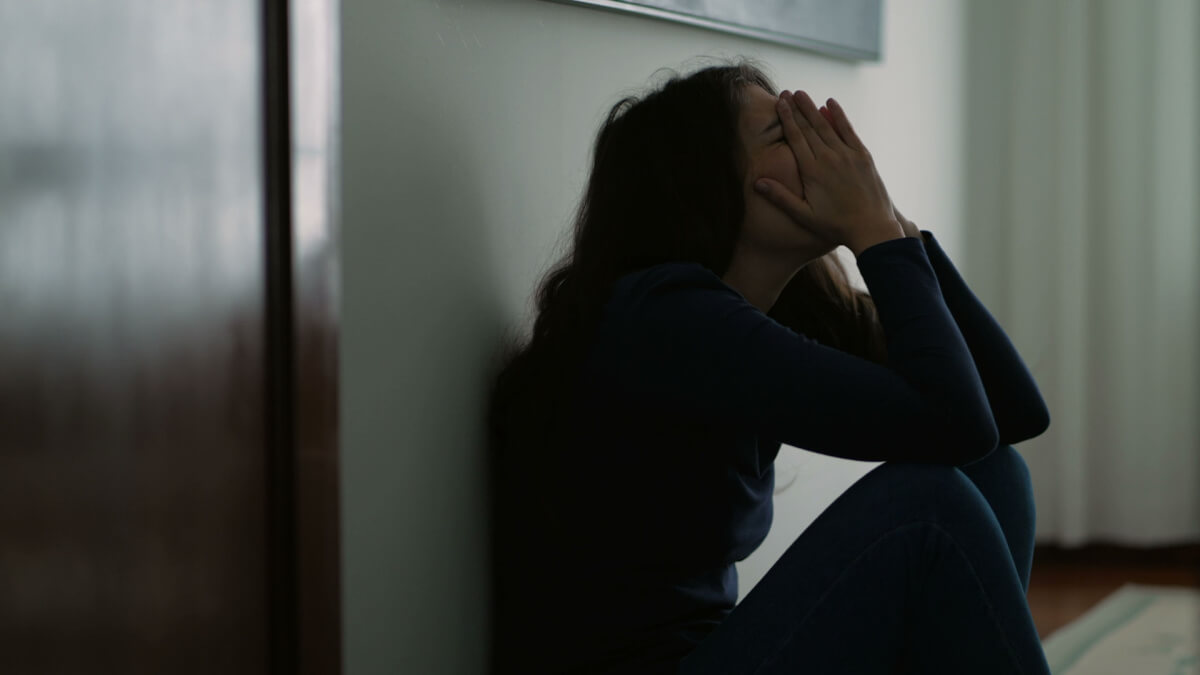
Involuntary rehab may be an option for families who have been unsuccessful in helping a loved one understand the need for addiction treatment. This process involves going in front of a court and presenting evidence to demonstrate that the individual is in danger of harming themselves or others due to their ongoing substance use disorder (SUD).[1]
The hope is that the judge will order the person to drug rehab with the goal of complete recovery. However, the process is not simple. In some states, it may not even be legal unless the person in question is a minor and a dependent of the petitioner.[1]
What Is Involuntary Rehab?
Involuntary rehab is the act of forcing someone living with a SUD to enter treatment even though they do not want to go. Essentially, it is a legal process that makes treatment mandatory for the person in question, such that leaving treatment or choosing not to go would be a violation of a court order.[2]
In some cases, involuntary rehab is ordered by a judge when criminal charges are pressed by the state, and it is apparent that the person committed the crime in the service of maintaining an ongoing SUD. Though the order for rehab is technically involuntary and a legal requirement in these cases, the defendant usually has the option to choose jail time over rehab if they really don’t want to go. Few do, however, viewing rehab as easier to manage than incarceration.
When Is Involuntary Rehab Considered?
There are a few different scenarios in which involuntary rehab may be considered. The most common include involuntary rehab as a sentence for a nonviolent crime and a response to a petition from those who allege that the person is in danger of hurting themselves or others.
Sentenced to Involuntary Rehab
Involuntary rehab may be considered in a court proceeding in which someone is charged with a crime that they say was only committed in order to help them manage a SUD.[2] For example, if someone were to break into a car and steal something or embezzle money from work, and they plead guilty to the charge and state that they had a drug addiction, the judge may determine that it is appropriate to “sentence” them to drug rehab.
It’s important to note, however, that this would not be the case if charges were violent in nature.
Family or State Request for Involuntary Rehab
Another situation in which involuntary rehab may be considered is if concerned family members or the state feel that someone is a danger to themselves or others due to an untreated SUD. In this case, the concerned parties may file a petition with the court seeking involuntary rehab for the person in crisis.
In these cases, it will be necessary for the petitioner to present evidence to support their claim. The amount and specifics of this requirement will vary from state to state but may include witnesses to support the claim, hospital visits caused by drug use, accidents that occurred under the influence, or specific harm to oneself or others that were perpetrated by the individual when they were under the influence.
The Legal Aspects of Involuntary Rehab
The legal requirements for getting an involuntary rehab order from a judge will be different in each state. In some cases, it will vary from county to county within a state.
In general, however, the cases in which involuntary rehab is ordered by a judge in response to a criminal charge will require the defendant to demonstrate that they are living with an active SUD. This may be done by sharing their prior attempts at rehab, current relationship or home status caused by drug misuse, or a statement from a medical professional.
Depending on the charge, especially if the person is charged with possession of a controlled substance, the person may need to demonstrate that they are not selling drugs. This charge will never result in involuntary rehab in lieu of jail time.
For individuals seeking involuntary rehab for a loved one, the burden of proof is significant. It is essential to prove that the person is likely to harm themselves or others and present a history of close calls and reasons for this concern in order to get the order.
The government takes the notion of forced involuntary rehab, also known as civil commitment, very seriously and guarantees rights for the person in question, including these:[3]
- The right to an attorney
- The right to an expert witness at trial
- The right to a jury trial
- The ability to defend against evidence that may result in a threat to the right to safety and freedom from confinement and the right to receive or refuse treatment
Involuntary Commitment Laws by State
Every state has a process that supports helping people get treatment when they are struggling with a severe mental illness, but not all states define substance misuse and SUD as a disorder.
As a result, filing for civil commitment or involuntary rehab based on untreated drug addiction may be too direct to be effective for some states. However, when someone can be shown to be a harm to themselves or someone else for any reason, they may be remanded to involuntary rehab by a court of law.
Currently, 37 states and the District of Columbia provide for involuntary rehab based on drug addiction and/or alcohol use disorder (AUD), two states only allow involuntary rehab for AUD, and one state allows involuntary rehab for substance misuse only.[4]
Alabama
While the Alabama Mental Health Code allows for involuntary commitment for someone who is a clear danger to themselves or others or if they cannot take care of themselves, there is no such stipulation based on any kind of addiction.[5]
The procedure is as follows:[5]
- A mental health professional or concerned family member files a petition with the court stating the risk of harm outside of an ongoing SUD.
- The court orders that a professional meet with the individual to ensure that they meet the standards for possible commitment.
- A hearing is scheduled for both sides to provide evidence. The individual may be provided with an attorney if they do not have one.
- The judge decides which type of facility will be most appropriate based on the person’s needs, if any.
Alaska
According to Alaska Statutes § 47.30.700, substance use is considered to fall under the state’s definition of a mental health issue that can indicate a need for involuntary rehab.[6]
In Alaska, however, timelines are a key piece of the process. Families considering this route will need to make sure that they move swiftly in order to avoid having the case thrown out and needing to start over again from the beginning.
Specifically, the length of time that a person can be held is less than 48 hours unless the judge has a reason to rule that their stay be extended up to 10 days while the application is vetted.
Arizona
The Arizona Revised Statutes, Title 36, Chapter 5 states that while involuntary commitment is possible under certain circumstances, addiction is not one of those circumstances.[7]
Like other states, it is possible to file for involuntary rehab based on the notion that it’s the best form of treatment for someone who is at risk of hurting themselves or someone else. However, the judge may order outpatient treatment, which for some families may not seem appropriate for someone who doesn’t want to be in rehab.
Families who would like to go this route start by filing a petition with court and supplying evidence that a hearing is necessary and that their loved one is at risk.
Arkansas
If there is a possibility that someone may engage in homicide or suicide or otherwise gravely harm someone, including themselves, addiction may be a reason for involuntary rehab in Arkansas.[8]
Applicants must submit the right forms, prepare for an evaluation and hearing, and submit the names of witnesses who may speak to the need for treatment, if appropriate.
California
California does not classify addiction to any substance as a plausible reason for involuntary rehab, but if families can show that their loved one is unable to care for themselves or in danger of hurting themselves, they may be able to successfully file a petition for involuntary rehab.[9] In this case the person may be held for up to 72 hours and, if requiring additional care, they can place a hold for up to an additional 14 days.
It will be necessary for the petitioner to demonstrate with evidence that the person requires treatment and that it’s not safe for them to be on their own.
Colorado
Under the Alcohol and Drug Abuse Treatment Act (ADATSA), Colorado families have the ability to petition the court to remand a loved one to drug rehab for up to 270 days.[10]
Like other states, it must be proven that the person is at imminent risk of harming themselves or someone else because they are living with an active SUD that requires treatment.
Connecticut
In Connecticut, the petitioner must show that the person in question is “gravely disabled” due to their substance misuse and SUD in order to obtain an involuntary rehab order. In order to do this, an evaluation must be done by a medical professional, and that evaluation must have taken place within the last two days.[11]
The hearing is promised within the week if the burden of proof is met. Then a person can be committed to inpatient treatment for between 30 and 180 days. However, if the treatment is not working or if the person is better and does not require that duration of treatment, they may be discharged early.
Delaware
Substance misuse is a legally viable reason for petitioning the court to have someone remanded to involuntary rehab in Delaware.[12] Whether the judge chooses outpatient or inpatient treatment and the length of their time in treatment will vary depending on the details.
District of Columbia
SUD and AUD are not classified as mental health disorders worthy of triggering a mandate to involuntary rehab in DC. However, if someone is deemed to be in immediate danger of harm due to chronically misusing alcohol, it is possible to be ordered to go to drug rehab. The same is true if the person is in immediate danger due to SUD.
Families should note, however, that if it’s the first or second time in a two-year period, the treatment order can last no longer than 30 days.[13]
Florida
Families can petition the court to have their loved one put into rehab involuntarily if it is objectively clear that they are a danger to themselves when they are under the influence. The Baker Act makes it clear that involuntary holds may be necessary in some cases, but it also stipulates that people who are targeted for involuntary rehab have the right to defend against being held anywhere against their will.[14]
Georgia
While substance misuse that can be demonstrated to create situations of imminent harm is a legally viable way to attain involuntary rehab for a loved one, substance misuse or SUD alone is not enough in Georgia.[15]
A family member can be the one to file a petition, but it may also be filed with success by a doctor or law enforcement. In all cases, the correct forms must be filed, and an evaluation and hearing will follow.
Hawaii
Demonstrating a history of substance misuse and direct negative consequences is key to filing for involuntary rehab under Hawaii’s Involuntary Commitment: Hawaii Revised Statutes Annotated § 334- 142.[16]
In the petition, the family must be able to bring evidence that shows someone will get hurt if the person doesn’t get treatment. They must also demonstrate that they have the money to pay for rehab, so the burden doesn’t fall on the state.
Idaho
SUD is not considered a mental illness in Idaho. Even though the state acknowledges that AUD has characteristics of a mental health disorder, they state outright that it is not enough for involuntary commitment to rehab.[17]
In this case, families will need to be able to show that the person is likely to harm themselves or someone else if they don’t receive treatment, which may or may not be limited to addiction treatment.
Illinois
In Illinois, families have to demonstrate imminent danger to self or others in order to have their loved one involuntarily sent to a rehab program. SUD itself is not reason enough.[18]
Additionally, families will be tasked with continuing to prove the need for treatment over time, as the courts will usually schedule multiple hearings every few weeks to make sure it is still appropriate. In most cases, the rehab time will not extend beyond 90 days.
Indiana
As long as someone is not charged with selling drugs or harming people, they may be eligible for involuntary rehab through the court system after they commit a crime while under the influence or in service of their SUD.[19]
In some cases, outpatient treatment may be ordered, which will require the person to have a safe place to live and support at home to be successful.
Iowa
While families can use a SUD as a reason to file a petition for involuntary rehab, they must also show that the person is at risk of harm to self or someone else.[20] It is possible to have someone held for up to 72 hours if they are under the influence and at risk of hurting someone for the purposes of an evaluation, but after that, they may be released pending a hearing.
Kansas
Addiction will only be considered a valid reason for involuntary rehab if it co-occurs with another mental illness. That is, it can only be a supporting factor and never a primary reason.[21]
In fact, mental illness is not enough either. The petitioner must be able to show that these issues contribute to the person being at high risk of hurting themselves or someone else.
Kentucky
If a family feels that their loved one is in harm’s way due to an untreated SUD, the Matthew Casey Wethington Act for Substance Abuse Intervention (Casey’s Law) protects their rights to request involuntary rehab through the courts.
It’s important to note, though, that the family must be prepared to pay the full bill for treatment. The length of treatment cannot go beyond 60 days in most cases or 360 days in cases where it can be demonstrated that extensive care is needed.[22]
Louisiana
A legal guardian or close immediate family (such as a spouse, parent or adult child) can file to have their loved one entered into involuntary rehab if that person has a SUD.[23]
The application will require a great deal of evidence, including personal observations that show the use of drugs and alcohol is actively putting the individual at risk of harm, a full statement of all the facts, and acknowledgement that the individual was offered treatment and they refused.
Maine
Maine Statute 34-B 3801 allows for family members to have a loved one living with a SUD committed to involuntary rehab on the basis of that addiction, perhaps due in part to the incredibly high rate of overdose in the state.[24]
For the petition to be successful, the petitioner must be able to show that the individual is likely to engage in homicide or suicide and/or are unable to take care of themselves.
Maryland
Maryland law allows for a person to be committed to involuntary rehab based only on the threat of imminent harm. Family members concerned about SUD will have to highlight the issues that demonstrate that their loved one is likely to hurt themselves or someone else.
This is not enough, however. Family members also have to show that all outpatient treatment options have been attempted unsuccessfully before they can get an involuntary rehab petition granted because the court will only order the person to go to inpatient treatment.[25]
Massachusetts
Substance misuse or SUD is a solid reason to ask the court for a loved one’s involuntary rehab under Massachusetts General Law Annotated Chapter 123 § 35 in Massachusetts. It’s a petition that can only be filed by specific people, however: blood relatives, a spouse, law enforcement or a medical professional.[26]
Should the petition be granted, the person may be ordered to go to inpatient or outpatient treatment. It is only considered as a ‘last resort’ when other treatment attempts have failed.
Michigan
SUD is only grounds for involuntary rehab in Michigan if it can be linked to potential harm to the person or to someone else.
The application requires an evaluation from a doctor that states that the person has had a recent medical exam, been diagnosed with a SUD as a result of the evaluation, and family is ready and willing to pay the bill for rehab.[27]
Minnesota
Minnesota courts prefer to grant a petition for addiction treatment on a voluntary basis, but if that is not possible, they will agree to remand someone to involuntary rehab based on an untreated SUD if it can be shown that they are in grave danger without treatment.[28]
Petitioners must be a close family member, medical personnel or law enforcement officer. They must provide evidence of their claims in order to secure a hearing.
Mississippi
House Bill 1546 that amends Section 41-31-1 of the Mississippi Code of 1972 allows for family members to petition the courts for help getting a loved one into treatment for an ongoing SUD when they are resistant to the idea in Mississippi.[29]
Family members have to show that the person is living with an active SUD and that they are unable to control themselves as a result, that they cannot manage their own personal care, and that treatment will demonstrably improve their health.
Missouri
Missouri allows for the petition for involuntary rehab in situations where drug misuse or SUD is the primary inciting issue behind the inability to care for oneself or for the risk of harm.
In 2021, when they implemented the Mental Health Parity and Addiction Equity Act of 2008, the process was made easier for families who were previously required to pay for treatment if it was mandated.[30] Now, families can get help from the state to cover those costs if needed.
Montana
Montana is another state where drug and alcohol misuse cannot be used as a basis for involuntary rehab, according to Montana Code Annotated § 53-21-102. Families may petition the courts if substance misuse has rendered their loved one incapable of caring for themselves or caused them to put themselves or others in danger.
Of note is the ongoing battle over HB 29, a bill that would limit the time spent in involuntary rehab for people living with Alzheimer’s, TBI and other forms of dementia. Because TBI is often associated with SUD, it could have an impact on the process of applying for involuntary rehab. At the time of this writing, the bill has passed both the House and Senate several times and been vetoed by the governor, but that veto is pending override.[31]
Nebraska
If substance misuse is a big enough problem that it causes someone to put themselves or others in harm’s way or makes it impossible to care for themselves, it is possible to have someone mandated to involuntary rehab in Nebraska.
Additionally, under Legislative Bill 668, Nebraska political officials are seeking to expand the ability of mental health professionals to put patients under an emergency hold if they report self-harm or the intent to hurt someone else while under the influence.[32] The hold would not automatically translate into involuntary rehab, but it would provide time to do an evaluation and submit the application to the court.
Nevada
In Nevada, involuntary rehab is called a legal hold or a legal 2000. It solely serves to get people into treatment if they have a history of harming others and a clear intent to repeat the behavior in the future.[33]
Involuntary rehab will likely only be mandated if it can be shown that substance misuse treatment will help address the issue and decrease the risk of danger.
New Hampshire
There is no recourse for helping a family member connect with treatment via involuntary rehab in New Hampshire due to the definition of mental illness under New Hampshire Revised Statute Annotated § 135-C:2 that specifically excludes addiction.
However, new laws have been developed that empower ER doctors to put a longer hold on someone who is brought to the hospital for a 72-hour psych hold.[34] Since this is a common occurrence for people who act out under the influence, it provides a pathway to better medical evaluation and an increased likelihood that someone who is struggling may be connected with treatment.
New Jersey
While New Jersey Statute Annotated § 30:4-27.2 makes it clear that behaviors engaged in while under the influence are not grounds for involuntary commitment to rehab, Bill A-4755 proposes that mental health professionals should be able to offer treatment that may include evaluations and mental health assessments on site at homeless shelters.[35]
Families that have a loved one who is living on the street due to SUD may find this valuable as they look for grounds on which to petition the government for involuntary rehab.
New Mexico
Drug and alcohol use may be part of the equation when filing for involuntary rehab in New Mexico, but it can’t be the sole reason for the petition. Additionally, petitioners must be able to show that outpatient treatment options have been exhausted for whatever the primary and secondary issues may be because New Mexico will only remand people to inpatient care.[36]
New York
With the help of New York Mental Hygiene Law § 1.03, families in New York may be able to get involuntary rehab for their loved one based on SUD even though it is not technically considered a mental health disorder legally by the state’s definition.
Families are also not the only ones who may be able to make the call that involuntary rehab is needed in the future, especially in New York City. A police officer or ER attendant may petition for involuntary rehab on behalf of someone who is struggling with behavior control due to substance misuse and SUD.[37]
North Carolina
Not only is substance misuse considered a reason for involuntary rehab in North Carolina and classified as a mental health disorder under North Carolina General Statute Annotated § 122C-281, but the state allows for anyone (not just blood relatives, spouses, law enforcement or medical personnel) to file the petition. This means that anyone who has knowledge that someone is in crisis and needs treatment may be able to take action.
Additionally, there are new bills on the table in North Carolina that would institute better systems for tracking those who go through involuntary rehab in the legal system. The goal is to make sure that there are enough resources available to those who need it.[38]
North Dakota
It is possible for family members to file for involuntary rehab, on behalf of loved ones who are living with an active SUD under North Dakota Century Code Annotated § 25-03.1- 08 in North Dakota. However, it is necessary to also include a list of events that support the need for treatment, as well as the contact information of other people who agree that treatment is immediately necessary.
It is also required to show that the use of drugs and alcohol is directly causing the person to engage in activities that are harmful to themselves or others.[39]
Ohio
Ohio requires families who would like to commit their loved one to involuntary rehab to demonstrate that substance misuse and SUD is putting them or someone else in danger and that treatment will help the situation, according to Ohio Revised Code Annotated §§ 5119.92 and 5119.93.
In the cases where a law enforcement officer files the petition for involuntary rehab, House Bill 281 allows for an initial hold for up to 10 days pending the filing and hearing but only when the person has committed a crime for which the punishment could possibly be involuntary rehab.[40]
Oklahoma
If family members can demonstrate to the court that their loved one is deteriorating due to their untreated substance misuse or at risk of harm or death, they may be able to successfully petition for involuntary rehab under Oklahoma Statute Annotated title 43A, §5-410.
It may also be possible to get an involuntary rehab mandate when there is someone else who is fearful of being hurt by someone who misuses drugs and alcohol. In this case, witnesses and events must be submitted to the court in order to support this claim.[41]
Oregon
The only way that substance use can support an involuntary rehab petition is if it can be directly linked back to a threat of grave danger or death to the individual or someone else under Oregon Revised Statute Annotated § 426.495.
This is not necessarily an arrangement that will stand long term, however. Three large hospital systems sued the State of Oregon for failing to place patients who had been involuntarily committed for care into treatment.[42] The result has been a number of different proposed bills for expanded laws regarding involuntary commitment.
Pennsylvania
If someone is unable to take care of their own basic needs or if their behavior is putting them in danger due to SUD, families have recourse under Pennsylvania’s Mental Health Procedures Act and Pennsylvania Statutes and Constitution Statute title 71 1690.105 to file for involuntary rehab.
In recent years, however, it has been harder for families to get their loved one remanded to treatment because laws loosened up the requirements to involuntary commitment to include assisted outpatient treatment in 2019. This resulted in more people in the program and a heavy cost to the county governments. As a result, many county governments choose only to allow involuntary rehab in cases where it is proven that inpatient treatment is needed, which has resulted in many people losing out on the outpatient treatment that could have helped them.[43]
Rhode Island
Alcoholism is classified as a viable reason for being placed in rehab involuntarily, but substance use is not under Rhode Island General Laws Annotated § 23-1.10- 10 in Rhode Island. In fact, involuntary rehab can be ordered when someone is picked up by law enforcement while incapacitated by alcohol.[44]
For families with a loved one in crisis due to SUD, it may be more difficult to secure an involuntary rehab order.
South Carolina
Addiction to any substance is considered good cause for an involuntary rehab order in South Carolina under South Carolina Code Annotated § 44-52-70, as long as use of substances can be directly connected to substantial risk of harm to oneself or others.[45]
Especially in the event that multiple criminal acts have occurred under the influence, or if it can be proven that use is excessive, other treatment options have failed, and that others can serve as witnesses to these issues, involuntary rehab will very often be the result of a petition in South Carolina courts.
South Dakota
Families can get an order for involuntary rehab based on addiction under South Dakota Codified Laws § 34-20A-70, as long as the individual in question fulfills the criteria as outlined in SDCL 27A-1-2.[46]
Some of the criteria involve providing evidence that the person is living with an active SUD, which is defined as a mental health disorder for legal purposes in South Dakota, and that they are disabled as a result or have the potential to hurt someone. Families will also need to show that treatment will be an effective solution for the individual and should resolve their issues.
Tennessee
In order to obtain an order of involuntary rehab in Tennessee, the petitioner will have to show that the person living with SUD is in danger of harming themselves or unable to avoid self-sabotaging choices. The petitioner also has to show that addiction treatment is a necessary next step in overall recovery.
Thought Tennessee Code Annotated §§ 33-6-502 and 33-6-504 allow for substance use as a reason for involuntary commitment to rehab, the petitioner will have to demonstrate that all other forms of treatment have been exhausted and proven to be ineffective.[47]
Texas
If a family member, law enforcement professional or medical personnel can show that someone who is living with an active SUD is clearly deteriorating in health or that they are unable to care for themselves, it may be possible to get an order for involuntary rehab in Texas under Texas Health & Safety Code § 462.062.
Texas has not limited its courts to ordering only outpatient or only inpatient treatment. Rather, the judge has the ability to determine which style of treatment will be most effective for the individual person on a case-by-case basis.[48]
Utah
There is no provision for involuntary rehab based on substance use or addiction alone in the state of Utah as per Utah Code Annotated § 62A-15-602. Families do have recourse, however, if they can demonstrate that substance misuse is a symptom of another mental health disorder or that compulsive use of substances is worsening the symptoms of their underlying condition. In these cases, the focus of treatment is unlikely to be drug or alcohol misuse and will instead focus on the underlying mental health condition.
This may not stand for long, however. The past few years have seen multiple bills proposed in the Utah House and Senate that would increase access to treatment through court-ordered involuntary rehab.[49]
Vermont
Per Vermont Statute Annotated title 18 § 8402, Vermont is one of very few states that allow for involuntary rehab only for the purposes of treating drug addiction and not for treating misuse of or addiction to alcohol.[50]
The law details the specific drugs of use that may be included. It describes the base cause of addiction to be mental illness but stops short of including alcohol.
Virginia
Involuntary admission could be granted under Virginia Statute § 37.2-814 in Virginia. Petitioners must be able to demonstrate that the issue is serious enough to put the person in crisis or to pose a threat to the people around them.
On its own, addiction is not enough to mandate an involuntary rehab admission. However, when coupled with another mental health issue and there is a risk of self-harm or harm to others, it can be.[51]
Washington
In Washington, under the Involuntary Treatment Act, families can apply for involuntary rehab for their loved one based on SUD as long as they can prove that that addiction can be characterized as a grave disability and the person can no longer care for themselves or control themselves while under the influence.[52]
If this cannot be proven, families will need to demonstrate that there is cause to fear that the individual may hurt themselves if they do not get into treatment immediately.
West Virginia
While West Virginian families can successfully apply for involuntary rehab status for their loved one based on substance misuse alone, they are tasked with proving that the person is unable to handle even the most basic responsibilities as a result of their drug and alcohol misuse.
The process of applying for an order of involuntary rehab in West Virginia is complex, so the state released videos to assist families in submitting the application correctly.[53]
Wisconsin
If a petitioner has evidence to support the notion that someone is at risk of serious physical injury, debilitation or death due to an untreated SUD, they may be able to garner an order for involuntary rehab under Wisconsin Statute Annotated § 51.20.
Wisconsin is unique in that it is not just blood relatives, law or medical personnel, or a spouse that may file a petition on behalf of someone in need of treatment. Three people who all agree that someone is in crisis due to SUD and would benefit from treatment can work together to file on that person’s behalf.[54]
Wyoming
There is no avenue to involuntary rehab based on substance misuse or SUD under Wyoming Statute Annotated § 25-10-101 in Wyoming, even if use of drugs and alcohol worsens a co-occurring mental health disorder or causes unsafe behaviors.
It is an issue of concern on the political landscape, however, so there may be changes to these laws coming in the near future.[55]
Intervention & Support
In some cases, a well-planned intervention can be more effective than involuntary drug rehab. Family members can encourage their loved one to seek treatment and, in so doing, encourage voluntary entrance into treatment.
A proper intervention will have the following characteristics:[56]
- Prearranged spot in treatment, so the person can leave immediately if they agree to go
- A nonjudgmental confrontation that is planned in advance by close friends and family members
- The offer of support from friends, family, therapists and others in the community as appropriate
- The element of surprise, so the person does not avoid the intervention
Additionally, if the person is under the influence when they arrive at the intervention, attendees should wait for them to be sober before beginning the intervention.
It should be noted that the intervention approach is somewhat controversial and it is not always effective.
Legal Options for Families
If a loved one is clearly in the throes of a SUD and unable to make medical decisions when necessary, involuntary rehab may be the best option. In some cases, it may be appropriate for a family member to seek a guardianship or conservatorship over their loved one.
A guardian is someone that the court approves as the person responsible for the support, safety and health of someone who is unable to care for themselves. They may make decisions about that person’s treatment, education and medical care, including helping them get into drug rehab.
A conservator is appointed by the court as responsible for the financial interests of someone who cannot manage their own money effectively.[57]
Both of these roles can be designated for a long or short period of time. They may be limited in nature or encompass the full scope of care. The details will be determined by the petition, the evidence and, ultimately, the judge’s decision.
Both processes begin with filing the correct forms with the court, showing up in court when ordered to do so and providing the requested information.[58] Families may choose to hire a lawyer to help them with this process.
The Importance of Professional Guidance
Whether you are considering filing for conservatorship, guardianship or involuntary rehab, or you are unsure which option is most appropriate in your situation, it is important to seek out professional guidance. While lawyers can help with filing forms, addiction specialists can guide the decision-making process regarding which solution will be most effective and how to handle the transition into treatment.
Telehealth & Online Rehab
For many, online rehab options are the most effective choice, especially for people who need Medication for Addiction Treatment (MAT) for opioid use disorder (OUD). With use of medications like Suboxone, opioid withdrawal symptoms and cravings can be successfully managed, allowing individuals to focus on skill-building work they are doing in therapy. With these tools, they can learn to live a better life in recovery.
For those who are resistant to treatment, the idea of being able to continue going to work and caring for family may make the prospect of addiction treatment more palatable. When finances are an issue, telehealth treatment is often the best route. Ultimately, online rehab opens up the possibility of addiction treatment to people for whom it might have previously been inaccessible.
Additionally, online rehab can provide long-term support to patients as they transition into independent recovery, requiring low-level support but also the freedom to begin the process of living life without drugs and alcohol. For many families, it’s the best solution in addiction treatment.
Conclusion
Involuntary rehab may be the best option for families who want to help their loved one get the treatment they need in recovery even when they refuse to go on their own.
The process will require meeting multiple legal requirements that vary from state to state. It isn’t an easy process, as the burden of proof is often large, but it might be the necessary step to helping your loved one. Seek professional guidance from addiction treatment specialists and legal professionals to make sure that no details are overlooked.

Reviewed By Peter Manza, PhD
Peter Manza, PhD received his BA in Psychology and Biology from the University of Rochester and his PhD in Integrative Neuroscience at Stony Brook University. He is currently working as a research scientist in Washington, DC. His research focuses on the role ... Read More
- Kerwin ME, Kirby KC, Speziali D, et al. What can parents do? A review of state laws regarding decision making for adolescent drug abuse and mental health treatment. Journal of Child & Adolescent Substance Abuse. 2015;24(3):166-176. https://doi.org/10.1080/1067828x.2013.777380
- Schottenfeld RS. Involuntary treatment of substance abuse disorders – Impediments to success. Psychiatry. 1989;52(2):164-176. https://doi.org/10.1080/00332747.1989.11024441
- Involuntary civil commitment: Fourteenth amendment due process protections. Congressional Research Service. Published May 24, 2023. Accessed January 24, 2023. https://crsreports.congress.gov/product/pdf/R/R47571
- Involuntary commitment for individuals with a substance use disorder or alcoholism. National Alliance for Model State Drug Laws. Published August 2016. Accessed January 24, 2023. https://www.mass.gov/doc/namsdl-involuntary-commitment-for-individuals-with-a-substance-use-disorder-or-alcoholism/download
- Code of Alabama 1975, Title 22: Health, Mental Health and Environmental Control, Chapter 52 COMMITMENT, DISCHARGE AND TRANSFER OF PERSONS IN STATE INSTITUTIONS, Section 22-52-1.2. The Alabama Legislature. Accessed March 16, 2024. https://casetext.com/statute/code-of-alabama/title-22-health-mental-health-and-environmental-control/subtitle-2-mental-health/chapter-52-commitment-discharge-and-transfer-of-persons-in-state-institutions/article-1-commitment-of-mentally-ill-persons-generally/section-22-52-12-filing-and-contents-of-petition-seeking-involuntary-commitment-of-another
- Sec. 47.30.700. Initial involuntary commitment procedures. The State of Alaska. Published 2019. Accessed March 16, 2024. https://casetext.com/statute/alaska-statutes/title-47-welfare-social-services-and-institutions/chapter-4730-mental-health/article-09-involuntary-admission-for-treatment/section-4730700-initial-involuntary-commitment-procedures
- Arizona Revised Statutes A.R.S. § 36-540. Arizona State Legislature. Accessed January 24, 2024. https://www.azleg.gov/viewdocument/?docName=https://www.azleg.gov/ars/36/00540.htm
- Commitments for mental illness/substance abuse. The Office of Lonoke County Prosecuting Attorney. Accessed January 24, 2024. https://www.lonokepa.com/victim-witness/commitments.
- Understanding the Lanterman-Petris-Short (LPS) Act. Disability Rights California. Published May 1 2023. Accessed January 24, 2024. https://www.disabilityrightsca.org/publications/understanding-the-lanterman-petris-short-lps-act
- Substance use commitment. Colorado Behavioral Health Administration. Accessed January 24, 2024. https://bha.colorado.gov/resources/substance-use-commitment
- Commitment for substance abuse disorders. OLR Research Report. Published March 1 2012. Accessed January 24, 2024. https://www.cga.ct.gov/2012/rpt/2012-r-0217.htm
- Involuntary commitment and guardianship laws for persons with a substance use disorder. National Judicial Opioid Task Force. Accessed January 24, 2024. https://www.ncsc.org/__data/assets/pdf_file/0028/18478/inv-comm-and-guard-laws-for-sud-final.pdf
- Code of the District of Columbia § 24–607 Commitment by court order. Council of the District of Columbia. Published May 25, 2023. Accessed January 24, 2024. https://code.dccouncil.gov/us/dc/council/code/sections/24-607
- Ex Parte Baker Act and Marchman Act. The Eighth Judicial Circuit of Florida. Accessed March 16, 2024. https://circuit8.org/departments-services/ex-parte-baker-act-marchman-act/
- Involuntary committals. Augusta Georgia Online Services. Accessed January 24, 2024. https://www.augustaga.gov/1651/Involuntary-Committals
- Petition. Hawaii State Legislature. Accessed January 24, 2024. https://www.capitol.hawaii.gov/hrscurrent/Vol06_Ch0321-0344/HRS0334/HRS_0334-0142.htm
- An overview of involuntary mental health holds in Idaho. Idaho State Bar. Published March 2020. Accessed January 24, 2024. https://isb.idaho.gov/blog/an-overview-of-involuntary-mental-health-holds-in-idaho/
- Illinois Compiled Statutes 405 ILCS 5/1-129 Sec. 1-129. Justia U.S. Law. Accessed March 16, 2024. https://law.justia.com/codes/illinois/2005/chapter34/55760.html
- 2017 Indiana Code TITLE 12. Human Services. Justia U.S. Law. Accessed January 24, 2024. https://law.justia.com/codes/indiana/2017/title-12/article-23/chapter-11.1/section-12-23-11.1-1/
- Legislative guide to involuntary hospitalization of persons with mental illness. Iowa Legislative Services Agency. https://www.legis.iowa.gov/DOCS/Central/Guides/involuntary.pdf
- Involuntary commitment. Office of the District Attorney 18th Judicial District Kansas. Accessed January 24, 2024. https://www.sedgwickcounty.org/district-attorney/involuntary-commitment/
- Involuntary commitment and guardianship laws for persons with a substance use disorder. Kentucky Legislature. Accessed March 16, 2024. https://apps.legislature.ky.gov/law/statutes/chapter.aspx?id=38279
- RS 28:55. Louisiana State Legislature. Justia U.S. Law. Accessed March 16, 2024. https://law.justia.com/codes/louisiana/2011/rs/title28/rs28-55
- Civil (involuntary) commitment for substance use disorders. Maine Medical Center. Accessed January 24, 2024. https://legislature.maine.gov/doc/8878
- Maryland. Treatment Advocacy Center. Accessed January 24, 2024. https://www.treatmentadvocacycenter.org/browse-by-state/maryland
- Section 35: Frequently asked questions about civil commitment of those with substance addiction problems and other options. Department of Public Health, Commonwealth of Massachusetts. Accessed March 16, 2024. https://www.mass.gov/info-details/section-35-the-process
- Legislative Analysis. Legislature. Accessed January 24, 2024. https://www.legislature.mi.gov/documents/2013-2014/billanalysis/House/pdf/2013-HLA-4486-53DEB0A3.pdf
- The Civil Commitment Process Minn. Stat. §§ 253B.07 – 253B.09 and 253B.17. Minnesota Office of Ombudsman for Mental Health and Developmental Disabilities. Accessed March 16, 2024. https://mn.gov/omhdd/assets/Civil-Commitment-Process-Fact%20Sheet_tcm23-467173.pdf
- House Bill 1546. Mississippi Legislature. Accessed January 24, 2024. http://billstatus.ls.state.ms.us/documents/2019/html/HB/1500-1599/HB1546IN.htm
- Missouri will become the last state to enforce federal mental health parity act. Missouri Independent. Published September 7, 2021. Accessed January 24, 2024. https://missouriindependent.com/2021/09/07/missouri-will-become-the-last-state-to-enforce-federal-mental-health-parity-act/
- HB 29: Revise laws related to involuntary commitment of people with dementia or TBI. Montana Free Press Capitol Tracker. Published June 12, 2023. Accessed January 24, 2024. https://apps.montanafreepress.org/capitol-tracker-2023/bills/hb-29/
- Nebraska bill would empower mental health experts to place people in emergency custody. Omaha World Herald. Published May 23, 2023. Accessed January 24, 2024. https://omaha.com/news/state-and-regional/govt-and-politics/nebraska-bill-would-empower-mental-health-experts-to-place-people-in-emergency-custody/article_8f39e3be-be91-11ed-9f44-57d2a363e67d.html
- Mental health crisis holds (also known as legal holds). Nevada Regional Behavioral Health Policies Board. Accessed January 24, 2024. https://nvbh.org/involuntary-hold/
- NH announces plan to end ‘ER boarding’ of psychiatric patients in next 2 years. New Hampshire Public Radio. Published May 19, 2023. Accessed January 24, 2024. https://www.nhpr.org/nh-news/2023-05-19/nh-announces-plan-to-end-er-boarding-of-psychiatric-patients-in-next-2-years
- Governor Murphy signs legislation allowing mental health care providers to play a crucial role within homeless shelters. State of New Jersey Governor Phil Murphy. Published May 15, 2023. Accessed January 24, 2024. https://www.nj.gov/governor/news/news/562023/approved/20230515h.shtml
- Petitions for treatment. National Alliance on Mental Illness – New Mexico. Accessed January 24, 2024. https://naminewmexico.org/resources/petitions-for-care/
- New York City directive to potentially involuntarily commit someone suffering a mental health crisis can proceed, court rules. CNN. February 4, 2023. Accessed January 24, 2024. https://www.cnn.com/2023/02/04/us/new-york-city-involuntary-commitment-directive/index.html
- Legislation seeks to find out many people in NC are involuntarily committed for mental health treatment. NC Newsline The Pulse. Published April 21, 2023. Accessed January 24, 2024. https://ncnewsline.com/briefs/legislation-seeks-to-find-out-many-people-in-nc-are-involuntarily-committed-for-mental-health-treatment/
- Civil commitments. Cass County, North Dakota. Accessed January 24, 2024. https://www.casscountynd.gov/our-county/state-s-attorney/civil-commitments
- Ohio Revised Code Section 2945.39 Expiration of the maximum time for treatment for incompetency. Ohio Legislative Service. Published April 6, 2023. Accessed January 24, 2024. https://codes.ohio.gov/assets/laws/revised-code/authenticated/29/2945/2945.39/4-6-2023/2945.39-4-6-2023.pdf
- Oklahoma Statutes Title 43A Mental Health. Oklahoma Senate. Accessed January 24, 2024. https://oksenate.gov/sites/default/files/2019-12/os43A.pdf
- Lawmakers in Ore., Calif. attempt to expand involuntary commitment. National Public Radio. Published March 28, 2023. Accessed January 24, 2024. https://www.npr.org/2023/03/28/1166630291/lawmakers-in-ore-calif-attempt-to-expand-involuntary-commitment
- PA’s controversial mental health law on involuntary treatment stands to get a test run more than 3 years after its passing. Public Source. Published July 5, 2022. Accessed January 24, 2024. https://www.publicsource.org/pa-aot-mental-health-involuntary-treatment-302/
- Title 23 – Health and Safety. State of Rhode Island General Assembly. Accessed January 24, 2024. http://webserver.rilin.state.ri.us/Statutes/TITLE23/INDEX.HTM
- Involuntary mental health commitments. Disability Rights South Carolina. Accessed January 24, 2024. https://www.disabilityrightssc.org/involuntary-mental-health-commitments/
- Behavioral health services. South Dakota Department of Social Services. Accessed January 24, 2024. https://dss.sd.gov/behavioralhealth/services.aspx
- How Tennessee’s involuntary psychiatric treatment law works. The Tennessean. Published November 17, 2018. Accessed January 24, 2024. https://www.tennessean.com/story/news/2018/11/18/mental-illness-involuntary-psychiatric-commitment-tennessee/1580525002/
- Texas hospitals’ process to protect people in psychiatric crisis. Texas Hospital Association. Accessed January 24, 2024. https://www.tha.org/wp-content/uploads/2023/03/ED-OPC-Whitepaper-2023.pdf
- ‘This is a crisis’: 3 bills could help Utah better identify and treat mentally ill defendants. The Salt Lake Tribune. Published February 17, 2023. Accessed January 24, 2024. https://www.sltrib.com/news/2023/02/17/this-is-crisis-3-bills-could-help/
- The Vermont Statutes Online. Vermont General Assembly. Accessed January 24, 2024. https://legislature.vermont.gov/statutes/fullchapter/18/181
- Understanding and applying Virginia’s new statutory civil commitment criteria. Virginia Department of Behavioral Health and Developmental Services. Accessed January 24, 2024. https://www.dbhds.virginia.gov/library/mental%20health%20services/omg-understanding-and-applying-virginias-new-statutory-civil-commitment.pdf
- The Involuntary Treatment Act (ITA). Washington State Healthcare Authority. Accessed March 16, 2024. https://www.hca.wa.gov/assets/program/fact-sheet-involuntary-treatment-act.pdf
- Supreme Court of Appeals State of West Virginia announces new videos explain involuntary commitment process. West Virginia Record. Published April 4, 2023. Accessed January 24, 2024. https://wvrecord.com/stories/640603454-supreme-court-of-appeals-state-of-west-virginia-announces-new-videos-explain-involuntary-commitment-process
- Mental health commitments. Racine County Wisconsin. Accessed January 24, 2024. https://www.racinecounty.com/departments/corporation-counsel/mental-health-commitments
- Legislation: What does Title 25 say? What does it mean for Sheridan County residents? The Sheridan Press. Published September 17, 2022. Accessed January 24, 2024. https://www.thesheridanpress.com/news/local/legislation-what-does-title-25-say-what-does-it-mean-for-sheridan-county-residents/article_68795fcc-347e-11ed-928d-1b496a5a6356.html
- Jhanjee S. Evidence based psychosocial interventions in substance use. Indian Journal of Psychological Medicine. 2014;36(2):112-118. https://doi.org/10.4103/0253-7176.130960
- Guardianship & conservatorship. Virginia Judicial System Court Self-Help. Accessed January 24, 2024. https://selfhelp.vacourts.gov/node/19/guardianship-conservatorship
- Guardianship & conservatorship forms. Virginia Judicial System Court Self-Help. Accessed January 24, 2024. https://selfhelp.vacourts.gov/node/49/guardianship-conservatorship-forms
Download Our Free Program Guide
Learn about our program, its effectiveness and what to expect
Related articles
Imagine what’s possible on the other side of opioid use disorder.
Our science-backed approach boasts 95% of patients reporting no withdrawal symptoms at 7 days. We can help you achieve easier days and a happier future.









